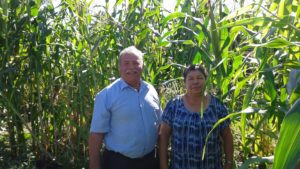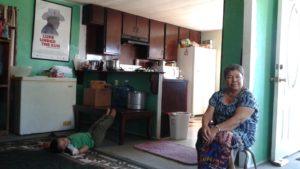Above: Director Rodrigo Reyes and stars, Danny and Ana Muratalla, explore one of the settings of his film Lupe Bajo el Sol.
By Hannah Esqueda
Images by Claudia J. Gonzalez
Editor’s Note: This weekend documentary filmmaker Rodrigo Reyes will premiere his film “Lupe Bajo el Sol (Lupe Under the Sun)” to a hometown audience in Merced. Inspired by tales of his own grandfather’s life as a migrant farmworker, the movie tells the story of an aging agricultural worker living in the Central San Joaquin Valley.
Merced County residents and real-life couple Daniel and Ana Muratalla star as ‘Lupe’ and his onscreen girlfriend ‘Gloria.’
Below are portions of a Q&A the stars and director did with We’Ced Youth Media ahead of the Oct. 22 premiere. Danny and Ana’s responses have both been translated from Spanish to English with assistance from Reyes.
Hannah Esqueda: What inspired the character of Lupe?
Reyes: It’s based on my grandpa because he got “lost” [in the United States]. He was lost for five years so I got inspired by that anecdote, a really crazy story that I didn’t know about and I made up a script about a man who ends up abandoning his family here in the U.S.
Danny: I know lots of guys who have gotten “lost”. They wouldn’t know their kids. I asked one guy, ‘what would you do if you saw your son?’ He didn’t know.
So it’s not Danny or Ana’s experience but this tale is something very familiar to them?
Reyes: The movie also tells the story of the relationship with women and how women are pushed out of emotional bonds with men by the way that immigration happens. [Ana] knows a lot of women like that and for years Danny moved back and forth while she stayed in Mexico.
Ana: That’s the way it happens lots of times. We were alone and he was over there. A very close friend of mine went through that and my grandma went through that experience. Those of us that come over here, sometimes they get lost. There’s a lot of things in the movie that are true, they’re not a lie. They’re the reality.
Even though the film isn’t about their life, it is their life up there on the screen in a way?
Reyes: Yes, it’s the difference between documentary and setting. Because it was a script, I brought the story and we adapted it to their life. So we used everything in the house. The bedroom, the kitchen, the dining table. Everything was brought into the narrative in a very organic way. They used their own clothes, there were no costumes. The makeup was like, their own makeup. It was fun but very personal.

Local actors, Danny and Ana Muratalla, portray ‘Lupe’ and ‘Gloria’ in Lupe Bajo el Sol.
How did you find the balance between the reality of such a situation and the fiction of the story?
Reyes: It was hard to separate themselves from the film as actors versus them as people.
Danny: I choked up when I finally saw it.
Ana: He cries when he sees the movie because he gets really nervous. People can think maybe that because we did these things it’s true or it’s our real life. But for many people it is true, not for us but for many. It hit us hard when we saw it, it shook me up.
While the film is about migrant farmworkers, you chose to keep the focus on this intimate portrayal of Lupe’s life rather than confront the politics of immigration directly. Why was that important for the story?
Reyes: The movie is very political because it does address something that is missing, which is talking about the emotional life of immigrants. That’s missing from the political conversation. People look at [migrant farmworkers and immigrants] in this black and white way and it’s very political in the outside world, but we don’t take the time to listen to what people are actually going through.
So the movie highlights that emotional life of immigrants, and by doing that it forces you to stop and see this community as real people.
What was the filming process like and how did you approach directing that with first-time actors?
Reyes: Danny and Ana both felt as though the pacing of the film is not slow, it’s the pacing of real life.
And it’s interesting to think about because when was the last time you saw people like Danny or Ana in a movie? When are they in a movie? These characters are always played by a movie star or their story has to appeal to White people.
In this movie, it’s shot in their terms, the terms of those characters. It’s challenging, it’s not an exciting action-packed movie, but it also celebrates their life without changing it into something more comfortable for us in the mainstream.
You filmed the movie mostly around Merced, correct?
Reyes: Yes, and even in [Danny and Ana’s] house. Many of the critical scenes in the film are shot here in their house.

Ana is captured in her humble home, one of the settings in Lupe Bajo el Sol.
Are you nervous about the film premiering in your hometown, where all your friends and family can finally watch it?
Danny: I’m not nervous. I’m very happy because the dream of this thing will stay forever in time. It’s a good memory.
Ana: We’re not nervous. We’re happy for them to see that because there’s some marriages that are living through this reality. Not in every marriage, but for some of them this is real. I’m happy for my kids to see it so they can see that life isn’t as easy as they think. And it will be a big surprise for them to see their father, who is like a whistling bird and always talking, and see how he’s so quiet in the film.
Reyes: Yes, he’s totally different than in real life. [Danny] is a talker, he loves to flirt and he loves to go out but in the movie he is sad and very depressed.
What message would you send to men who are trying to migrate here [from Mexico]?
Danny: I would tell them that they have to try hard if they’re going to do it, because you see how things are over there [in Mexico], they’re killing lots of people.
Ana: Danny gets [choked up] when we talk about the movie.
Reyes: Because think about Danny as someone who has worked his whole life in agriculture, with his body. He’s always been working since he was a child in Mexico. So for there to be a movie about it and to go through that experience, it’s very emotional. But when he cries, it’s not bad. It’s like good tears I think. It’s good because he’s processing the emotion of it all and I think [at the movie premiere] you’ll see more of it.But it’s a good thing because we never talk about these stories. For people to see the movie and come and watch it, they can see ‘Wow, my stories can be made into a work of art.’ Because so many times we don’t think of our stories as being important.
What is the main message you want people to take away from the film?
Reyes: For me, I really hope people watch the film and go ‘Wow, I know this man!’ or ‘I love this man,’ ‘I hate this man!’ There’s a lot of powerful emotions with this movie because he does have a lot of contradictions. [Lupe] basically doesn’t behave very well throughout the film. He’s abandoned his family and then he keeps doing things that are not exactly nice.
Lupe Bajo el Sol will be premiere this Saturday, October 22nd at the Merced Multicultutal Arts Center located in downtown. The film is screening at no cost at 3pm and 6pm.
 Translate
Translate
